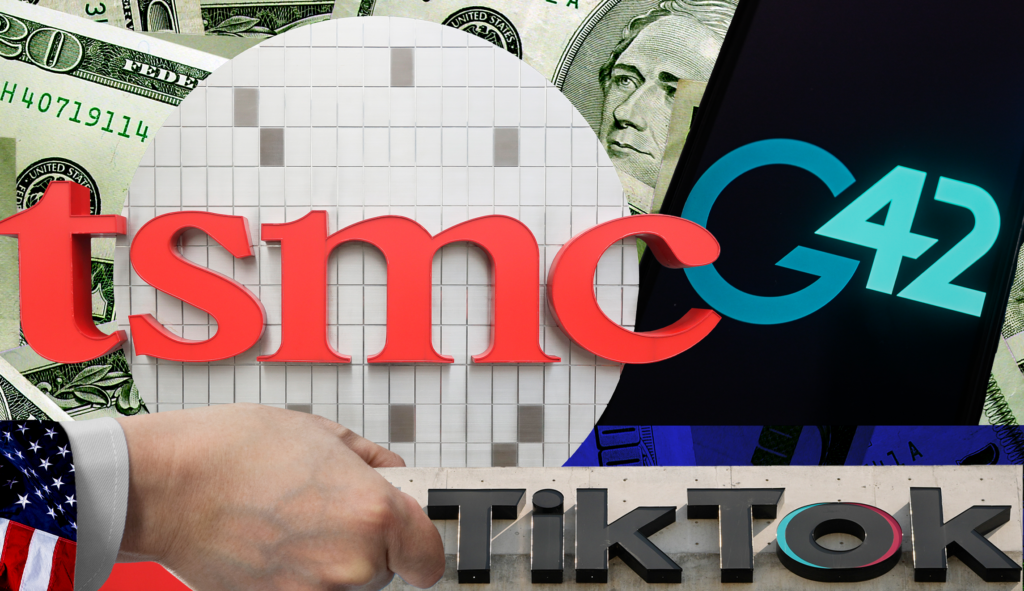
Congress may be all abuzz about forcing the Chinese owners of TikTok to sell the social media company so that the communists can’t control impressionistic U.S. teenagers with their propaganda. But it’s hardly the only effort being made by federal authorities to try to lessen the influence of foreign threats in sensitive areas of technology.
In the United Arab Emirates, for example, the U.S. government has worked with Microsoft for the tech giant to buy a minority stake in that country’s dominant artificial intelligence company, G42. A key part of securing the deal was to ensure G42 disposed of Chinese hardware it was using in its operations.
Even just in recent weeks, the U.S. government has doled out numerous grants to both domestic and friendly foreign semiconductor manufacturers in a bid to halt the dominance of the world’s largest semiconductor company, Taiwan-based TSMC. U.S. authorities very much view TSMC as being under Chinese influence.

The semiconductor grants have largely been greeted with enthusiasm. Consider the reaction of Senate Majority Leader Chuck Schumer (D-NY) to the recent award of $6.1 billion in such grants to Micron Technology, which will aid that company in building manufacturing plants both in Schumer’s home state and in Idaho.
“This monumental and historic federal investment will power and propel Micron to bring its transformative $100+ billion four-fab project in central New York to life, creating an estimated 50,000 jobs,” Schumer said.
That grant, as well as others to Intel, Samsung, and even TSMC to boost manufacturing facilities in the United States, stems from the federal CHIPS and Science Act, which has a $52.6 billion budget allocated to it.
In reality, U.S. chip production has shrunk from 37% of the global market in 1990 to just 12% in 2020, according to the Semiconductor Industry Association. In an era of ever-growing insecurity, hostile players, and staggering competitiveness, therefore, it may seem to make sense for the U.S. government to be subsidizing this and other important technology industries when there are national security issues at stake.
“AI and cybersecurity are already integral to national defense systems and infrastructure, and governments must ensure that these technologies are secure from foreign interference and manipulation,” said Ted Miracco, CEO of Approov Mobile Security, a cybersecurity company based in Palo Alto, California. “Data and AI are also major drivers of economic growth and competitiveness, and governments recognize the need to foster a strong domestic AI industry and not fall behind on the global stage. The goal of such intervention is not only to mitigate risks but also to maximize the benefits these technologies can offer to society.”
And the U.S. is only doing what other actors around the world, notably the Chinese and the Russians, have stated is their long-term aim.
“There is a new arms race as the U.S., China, and Russia have stated in their national security strategies that achieving dominance in AI is a priority,” said Tom Kellermann, senior vice president of cyber strategy at Los Altos, California-based Contrast Security. “This race to singularity has been burgeoning for the past five years. This does represent a holistic and long-term effort by the U.S. government.”
Not everyone’s on board
Not everyone agrees that such government action in the form of grants, or actively working with private companies to influence markets, is the best form of action.
The federal government spends about $100 billion annually on “corporate welfare,” equivalent to $800 a household, according to the Cato Institute. Such subsidies and grants induce recipient companies to become bloated and inefficient, Chris Edwards, Kilts family chairman in fiscal studies at the Cato Institute, told the Washington Examiner.
“The federal government’s role is to track threats, to warn about the Chinese, but not to actively intervene in markets,” he said. “How do we prevent China from accessing or stealing our most advanced technologies? I don’t know the answer. But I don’t think the answer is subsidizing our companies.”
Such government action is the opposite of what venture capital firms do, which is to try purposely to minimize the cash infusion to startups and young companies to keep them lean and efficient, he added. Vast VC and angel funding of the U.S. high-tech industry over the past decade means there is absolutely no “market failure” that would require federal intervention with subsidies.
Instead, it is excessive regulation and higher-than-average international corporate tax rates that scare foreign companies from investing in the U.S., Edwards said.
It’s happened before
Whatever the merits, the idea of giving federal grants to private companies or interfering in private business in the name of national security, such as the Microsoft G42 situation, is nothing new, said Irina Tsukerman, president of Scarab Rising, a security and geopolitical strategic risk group.
“This growing trend is a more modern take on the tech and arms race the U.S. was dealing with the Soviet Union during the Cold War,” she said. “Unlike the Cold War, however, the U.S. is now dealing with a network of adversaries with far more significant technology capabilities than what it faced at the time.”
And China is a prime example, she said, of a country focusing on gearing the bulk of its intelligence gathering toward industrial espionage so that it can penetrate the private sector and steal trade secrets in significant security areas, such as advanced internet, cyber, AI, and semiconductors.
“China views both the economy and defense sectors as a zero-sum game, which means it is willing to lean on dishonest methods to undermine competition and to procure competitive advantage,” she said.
The stakes may just, in the end, be too high to rely on free markets to solve all the problems such security issues and foreign threats bring. The U.S. may have been partly responsible for allowing such situations to happen, Commerce Secretary Gina Raimondo has said in recent comments.
CLICK HERE TO READ MORE FROM THE WASHINGTON EXAMINER
“We allowed manufacturing in this country to wither on the vine in search of cheaper labor in Asia, cheaper capital in Asia, and here we are,” she said in a recent television interview on CBS. “We just pursued profit over national security.”
Such behavior cannot be allowed to continue unchecked as security concerns grow ever more threatening, she said.
Nick Thomas is a writer based in Denver, Colorado.






